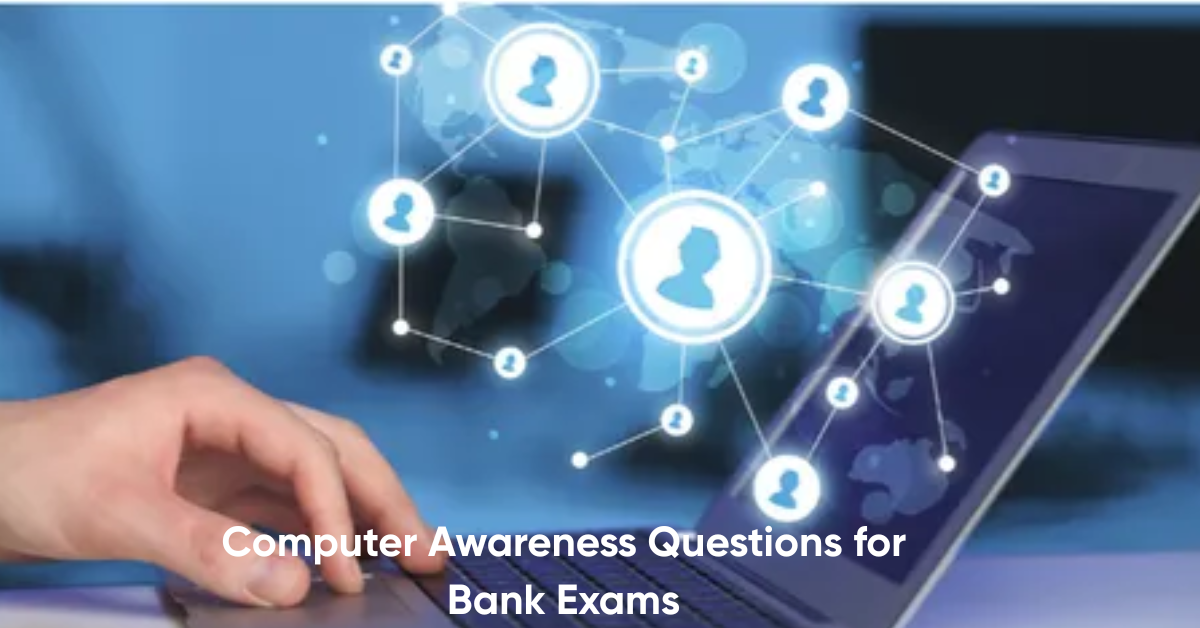Computer Awareness Questions for Bank Exams: In the modern banking sector, digital technology plays a pivotal role in everyday operations. As banks increasingly rely on computerized systems for transactions, record-keeping, and communication, it has become imperative for aspirants preparing for bank exams to have a solid understanding of computer fundamentals. The computer awareness section in banking exams like IBPS PO, IBPS Clerk, SBI PO, and RBI Grade B tests candidates on their ability to handle basic computer concepts, software applications, and cybersecurity essentials.
Importance of Computer Awareness in Banking Exams
The banking industry handles vast amounts of sensitive data daily, which demands efficient and secure computer operations. Therefore, examiners emphasize testing candidates on computer knowledge to ensure they can adapt to the digital tools and software banks use. Topics commonly covered include computer hardware, software, internet technologies, security protocols, and commonly used banking software.
Key Areas to Focus in Computer Awareness in Bank Exams
- Basic Computer Terminology: Understanding hardware, software, operating systems, and peripherals.
- Operating Systems: Knowledge about Windows, Linux, and macOS basics.
- MS Office Suite: Usage of Word, Excel, PowerPoint, and Outlook.
- Internet and Networking: Concepts of IP address, HTTP, browsers, and email protocols.
- Cybersecurity: Basics of viruses, malware, firewall, and data protection.
- Banking Software: Awareness of core banking solutions and related applications.
- Shortcut Keys & Functions: Important keyboard shortcuts for efficiency.
Sample Computer Awareness Questions for Bank Exams
Here is a set of 50 frequently asked questions along with answers to help you prepare effectively for the Computer Awareness section:
Computer Fundamentals
- Which of the following is considered the brain of the computer?
- a) Monitor
- b) CPU
- c) Keyboard
- d) Mouse
- Answer: b) CPU
- What does RAM stand for?
- a) Read Access Memory
- b) Random Access Memory
- c) Run Access Memory
- d) Real Access Memory
- Answer: b) Random Access Memory
- Which of the following is not an input device?
- a) Keyboard
- b) Mouse
- c) Monitor
- d) Scanner
- Answer: c) Monitor
- Which part of the computer is used for permanent data storage?
- a) RAM
- b) ROM
- c) Hard Disk
- d) Cache
- Answer: c) Hard Disk
- What is the full form of ALU?
- a) Arithmetic Logic Unit
- b) Application Logic Unit
- c) Array Logic Unit
- d) Advanced Logic Unit
- Answer: a) Arithmetic Logic Unit
Operating Systems
- Which of the following is not an operating system?
- a) Windows
- b) Linux
- c) Oracle
- d) DOS
- Answer: c) Oracle
- Which operating system is developed by Apple Inc.?
- a) Windows
- b) Linux
- c) macOS
- d) Unix
- Answer: c) macOS
- What is the function of an operating system?
- a) Manage hardware and software resources
- b) Provide a user interface
- c) Execute and provide services for applications
- d) All of the above
- Answer: d) All of the above
- Which of the following is a mobile operating system?
- a) Android
- b) Windows
- c) Linux
- d) macOS
- Answer: a) Android
- Which operating system is open-source?
- a) Windows
- b) Linux
- c) macOS
- d) DOS
- Answer: b) Linux
Software and Programming
- What does GUI stand for?
- a) Graphical User Interface
- b) General User Interface
- c) Graphical Uninstall Interface
- d) General Uninstall Interface
- Answer: a) Graphical User Interface
- Which of the following is a programming language?
- a) MS Word
- b) Excel
- c) Java
- d) PowerPoint
- Answer: c) Java
- What is the main function of a compiler?
- a) Execute programs
- b) Translate high-level language to machine language
- c) Debug programs
- d) None of the above
- Answer: b) Translate high-level language to machine language
- Which of the following is system software?
- a) MS Word
- b) Operating System
- c) Excel
- d) PowerPoint
- Answer: b) Operating System
- Which language is used to create web pages?
- a) HTML
- b) C++
- c) Java
- d) Python
- Answer: a) HTML
Internet and Networking
- What does URL stand for?
- a) Uniform Resource Locator
- b) Uniform Resource Link
- c) Unified Resource Locator
- d) Uniform Reference Link
- Answer: a) Uniform Resource Locator
- Which protocol is used to transfer web pages?
- a) FTP
- b) HTTP
- c) SMTP
- d) SNMP
- Answer: b) HTTP
- What is the function of a router?
- a) Connects devices to a network
- b) Stores data
- c) Processes data
- d) None of the above
- Answer: a) Connects devices to a network
- Which of the following is not a web browser?
- a) Chrome
- b) Firefox
- c) Safari
- d) Linux
- Answer: d) Linux
- What does IP stand for in networking?
- a) Internet Protocol
- b) Internal Protocol
- c) Internet Process
- d) Internal Process
- Answer: a) Internet Protocol
Microsoft Office Tools
- Which application is used for creating spreadsheets?
- a) MS Word
- b) MS Excel
- c) MS PowerPoint
- d) MS Access
- Answer: b) MS Excel
- In MS Word, which shortcut is used to copy text?
- a) Ctrl + X
- b) Ctrl + C
- c) Ctrl + V
- d) Ctrl + Z
- Answer: b) Ctrl + C
- Which file extension is used for PowerPoint presentations?
- a) .docx
- b) .xlsx
- c) .pptx
- d) .pdf
- Answer: c) .pptx
- Which function is used to calculate the sum in Excel?
- a) =ADD()
- b) =SUM()
- c) =TOTAL()
- d) =COUNT()
- Answer: b) =SUM()
- Which application is used for managing databases?
- a) MS Word
- b) MS Excel
- c) MS Access
- d) MS PowerPoint
- Answer: c) MS Access
Computer Security
- What is a firewall in computer networks?
- a) A virus
- b) A security system
- c) A type of software
- d) None of the above
- Answer: b) A security system
- Which of the following is a type of malware?
- a) Antivirus
- b) Firewall
- c) Trojan Horse
- d) Spyware
- Answer: c) Trojan Horse
- What does CAPTCHA stand for?
- a) Completely Automated Public Turing test to tell Computers and Humans Apart
- b) Computer Automated Public Turing test to tell Computers and Humans Apart
- c) Completely Automated Personal Turing test to tell Computers and Humans Apart
- d) None of the above
- Answer: a) Completely Automated Public Turing test to tell Computers and Humans Apart
- Which of the following is used to protect data from unauthorized access?
- a) Encryption
- b) Compression
- c) Decryption
- d) None of the above
- Answer: a) Encryption
- What is phishing?
- a) A type of fishing
- b) A method to secure data
- c) Fraudulent attempt to obtain sensitive information
- d) None of the above
- Answer: c) Fraudulent attempt to obtain sensitive information
Data Storage and Devices
- Which of the following is a secondary storage device?
- a) RAM
- b) ROM
- c) Hard Disk
- d) Cache
- Answer: c) Hard Disk
- What does SSD stand for?
- a) Solid State Drive
- b) Secure Storage Device
- c) Simple Storage Drive
- d) None of the above
- Answer: a) Solid State Drive
- Which storage device uses magnetic tape?
- a) Hard Disk
- b) Floppy Disk
- c) Magnetic Tape Drive
- d) CD-ROM
- Answer: c) Magnetic Tape Drive
- What is the storage capacity of a standard CD-ROM?
- a) 650 MB
- b) 700 MB
- c) 800 MB
- d) 1 GB
- Answer: b) 700 MB
- Which of the following is not a storage device?
- a) Hard Disk
- b) RAM
- c) Monitor
- d) SSD
- Answer: c) Monitor
Computer Abbreviations
- What does CPU stand for?
- a) Central Processing Unit
- b) Central Programming Unit
- c) Computer Processing Unit
- d) Control Processing Unit
- Answer: a) Central Processing Unit
- What is the full form of USB?
- a) Universal Serial Bus
- b) Universal System Bus
- c) Unified Serial Bus
- d) None of the above
- Answer: a) Universal Serial Bus
- What does HTTP stand for?
- a) HyperText Transfer Protocol
- b) HyperText Transmission Protocol
- c) HighText Transfer Protocol
- d) None of the above
- Answer: a) HyperText Transfer Protocol
- What is the full form of LAN?
- a) Local Area Network
- b) Large Area Network
- c) Long Area Network
- d) None of the above
- Answer: a) Local Area Network
- Which of the following is the brain of the computer?
- a) RAM
- b) CPU
- c) Hard Disk
- d) ROM
- Answer: b) CPU
- What does BIOS stand for?
- a) Basic Integrated Operating System
- b) Basic Input Output System
- c) Binary Integrated Operating System
- d) Basic Inter Output Setup
- Answer: b) Basic Input Output System
- What is the full form of PDF?
- a) Portable Document File
- b) Public Document Format
- c) Portable Document Format
- d) Programmed Data Format
- Answer: c) Portable Document Format
- What does ICT stand for in computer terminology?
- a) Information Computer Technology
- b) Internet Communication Technology
- c) Information and Communication Technology
- d) Integrated Computing Technology
- Answer: c) Information and Communication Technology
- Which of the following is NOT an example of an operating system?
- a) Ubuntu
- b) Windows 10
- c) Oracle
- d) Fedora
- Answer: c) Oracle
- Which of the following is used to connect computers in a LAN?
- a) Modem
- b) Router
- c) Switch
- d) Repeater
- Answer: c) Switch
- Which device converts digital signals to analog for transmission over telephone lines?
- a) Router
- b) Switch
- c) Modem
- d) Repeater
- Answer: c) Modem
- What is the process of starting or restarting a computer called?
- a) Resetting
- b) Booting
- c) Debugging
- d) Logging in
- Answer: b) Booting
- Which of the following is a cloud storage service?
- a) Dropbox
- b) VLC
- c) Chrome
- d) Outlook
- Answer: a) Dropbox
- Which key is used to refresh a webpage?
- a) F3
- b) F5
- c) F7
- d) F10
- Answer: b) F5
- Which of the following is not a programming language?
- a) Python
- b) Java
- c) C++
- d) Oracle
- Answer: d) Oracle
- Which memory is used to store data permanently in a computer?
- a) RAM
- b) ROM
- c) Cache
- d) Registers
- Answer: b) ROM
- Indian Bank Recruitment 2025 Out for 1500 Apprentice Posts

- Indian Bank Apprentice Salary 2025, Pay Scale, Salary Structure

- Indian Bank Apprentice Syllabus & Exam Pattern 2025, Check Details

- SBI CBO Sectional Timing 2025, Know Subject-wise Timings

- SBI CBO Last Minute Tips Before Exam, Check Now

- SBI CBO 2025 Shift Timings, Exam Instructions & Documents to Carry


The most comprehensive online preparation portal for MBA, Banking and Government exams. Explore a range of mock tests and study material at www.oliveboard.in
